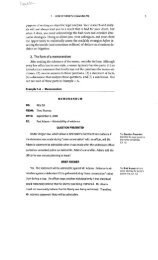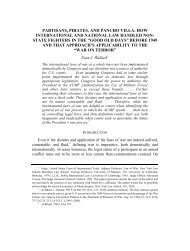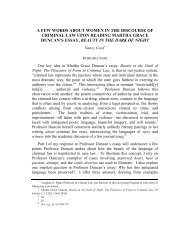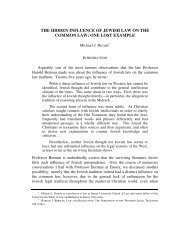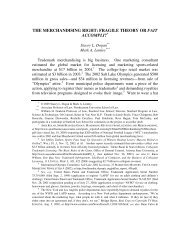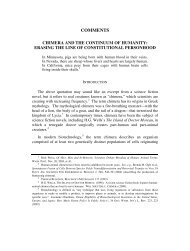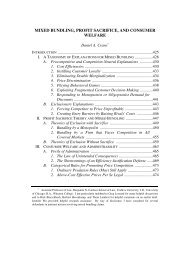life, liberty, and the pursuit of swords and armor - Emory University ...
life, liberty, and the pursuit of swords and armor - Emory University ...
life, liberty, and the pursuit of swords and armor - Emory University ...
Create successful ePaper yourself
Turn your PDF publications into a flip-book with our unique Google optimized e-Paper software.
1330 EMORY LAW JOURNAL [Vol. 57<br />
d. Contracting out <strong>of</strong> Property Rights<br />
Scholars also argue that current contracts make <strong>the</strong> prosecution <strong>of</strong> virtual<br />
good <strong>the</strong>fts impossible. 194 Property rights are by nature alienable. A player<br />
can always give up her ownership rights over a virtual good through a<br />
contract. 195 In most MMORPGs, a player must sign an End-User Licensing<br />
Agreement (EULA) before beginning to play. 196 The language <strong>of</strong> <strong>the</strong>se<br />
contracts is simple: <strong>the</strong> MMORPG provider retains all intellectual <strong>and</strong> property<br />
rights in all objects in <strong>the</strong> game. 197<br />
194 Meehan, supra note 8, at 12–26. Essentially, scholars argue that <strong>the</strong>se games are licensed, not sold,<br />
<strong>and</strong> thus are immune from copyright’s first-sale doctrine, which allows “<strong>the</strong> owner <strong>of</strong> a particular copy . . .<br />
without <strong>the</strong> authority <strong>of</strong> <strong>the</strong> copyright owner, to sell or o<strong>the</strong>rwise dispose <strong>of</strong> <strong>the</strong> possession <strong>of</strong> that copy.”<br />
17 U.S.C. § 109(a) (2006). See generally MARK A. LEMLEY ET AL., SOFTWARE AND INTERNET LAW 322–23<br />
(3d ed. 2006) (describing that publishers license ra<strong>the</strong>r than sell <strong>the</strong>ir s<strong>of</strong>tware to retain control after resale).<br />
Yet,<br />
[h]istorically, <strong>the</strong> purpose <strong>of</strong> ‘licensing’ computer program copy use was to employ contract<br />
terms to augment trade secret protection in order to protect against unauthorized copying at a<br />
time, when, first, <strong>the</strong> existence <strong>of</strong> a copyright in computer programs was doubtful, <strong>and</strong>, later,<br />
when <strong>the</strong> extent to which copyright provided protection was uncertain.<br />
S<strong>of</strong>tman Prods. Co. v. Adobe Systems, Inc., 171 F. Supp. 2d 1075, 1083 (C.D. Cal. 2001). It could be argued<br />
that this purpose is not truly applicable to MMORPGs, thus making <strong>the</strong> extension <strong>of</strong> licensing protection—<strong>and</strong><br />
consequently <strong>the</strong> exclusion <strong>of</strong> <strong>the</strong> first-sale doctrine protection—to MMORPGs questionable. See id. at 1091<br />
(“[This] system <strong>of</strong> ‘licensing’ which grants s<strong>of</strong>tware publishers this degree <strong>of</strong> unchecked power to control <strong>the</strong><br />
market deserves to be <strong>the</strong> object <strong>of</strong> careful scrutiny.”).<br />
195 Cf. Shi-Ling Hsu, A Two-Dimensional Framework for Analyzing Property Rights Regimes, 36 U.C.<br />
DAVIS L. REV. 813, 868–69 (2003) (noting that alienability is a property right).<br />
196 See, e.g., World <strong>of</strong> Warcraft, End User License Agreement, http://www.world<strong>of</strong>warcraft.com/legal/<br />
eula.html (last visited Mar. 3, 2007); Station Pass, End User License Agrement, http://tanarus.station.sony.<br />
com/eula.jsp (last visited Mar. 3, 2007).<br />
197 For example, World <strong>of</strong> Warcraft’s Terms <strong>of</strong> Use state:<br />
Blizzard does not recognize <strong>the</strong> transfer <strong>of</strong> Accounts. You may not purchase, sell, gift or trade<br />
any Account, or <strong>of</strong>fer to purchase, sell, gift or trade any Account, <strong>and</strong> any such attempt shall be<br />
null <strong>and</strong> void. Blizzard owns, has licensed, or o<strong>the</strong>rwise has rights to all <strong>of</strong> <strong>the</strong> content that<br />
appears in <strong>the</strong> Program. You agree that you have no right or title in or to any such content,<br />
including <strong>the</strong> virtual goods or currency appearing or originating in <strong>the</strong> Game, or any o<strong>the</strong>r<br />
attributes associated with <strong>the</strong> Account or stored on <strong>the</strong> Service. Blizzard does not recognize any<br />
virtual property transfers executed outside <strong>of</strong> <strong>the</strong> Game or <strong>the</strong> purported sale, gift or trade in <strong>the</strong><br />
“real world” <strong>of</strong> anything related to <strong>the</strong> Game. Accordingly, you may not sell items for “real”<br />
money or o<strong>the</strong>rwise exchange items for value outside <strong>of</strong> <strong>the</strong> Game.<br />
World <strong>of</strong> Warcraft, Terms <strong>of</strong> Use, http://www.world<strong>of</strong>warcraft.com/legal/terms<strong>of</strong>use.html (last visited Mar. 3,<br />
2008). For a thorough analysis <strong>of</strong> MMORPG EULAs, see David P. Sheldon, Comment, Claiming Ownership,<br />
but Getting Owned: Contractual Limitations on Asserting Property Interests in Virtual Goods, 54 UCLA L.<br />
REV. 751 (2007).



